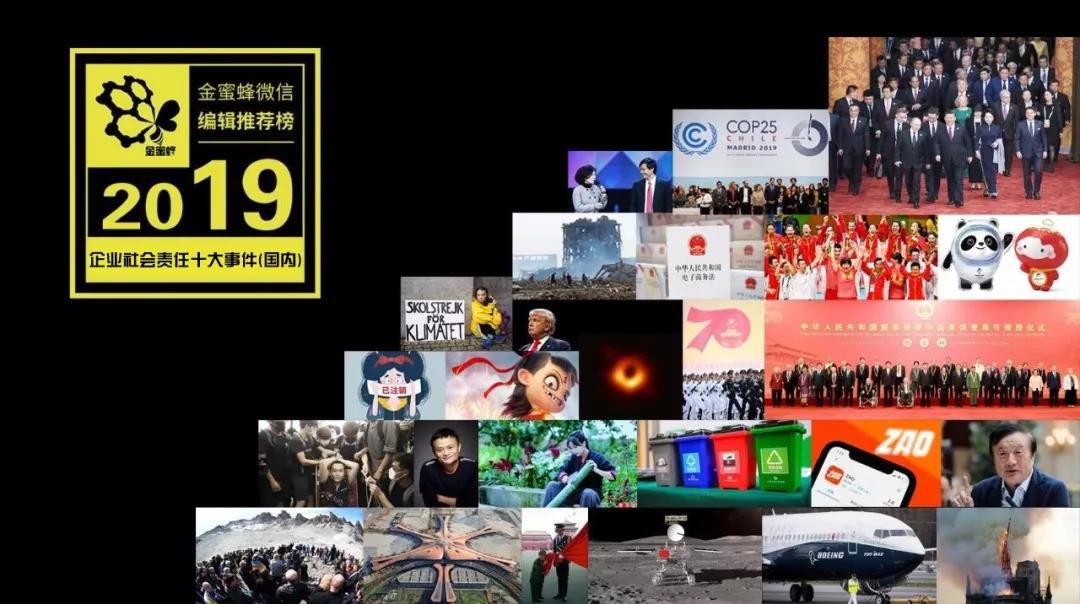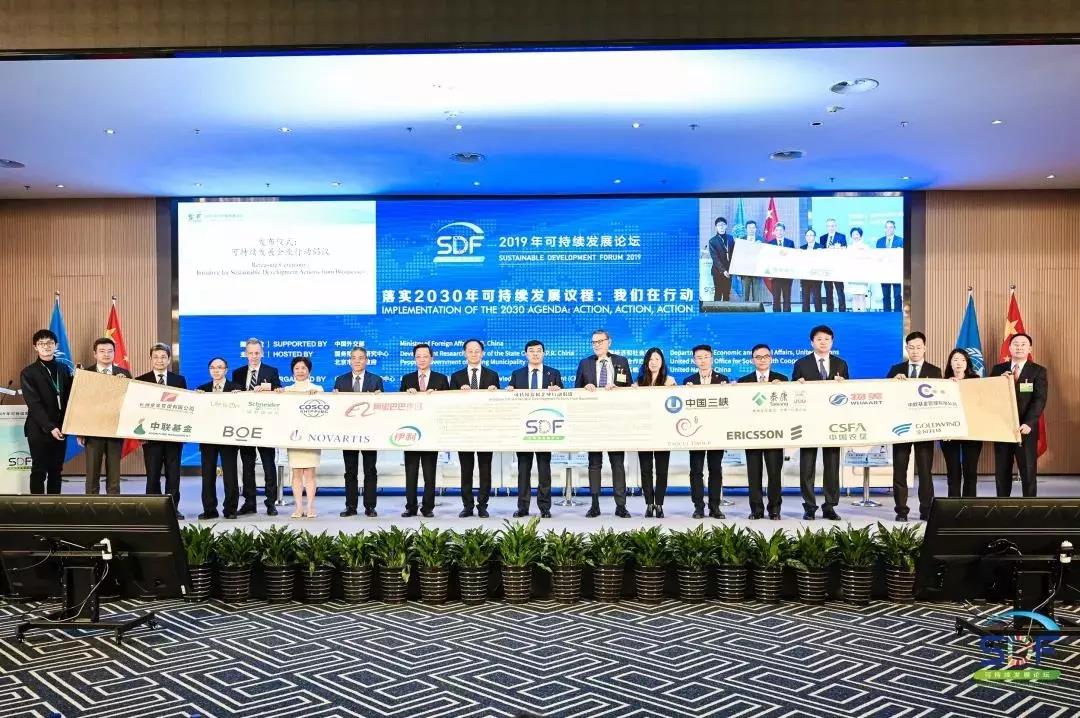2019 Top 10 CSR Events in China
2020-01-22GoldenBeeGoldenBee0

In the past 2019, we have celebrated the 70th anniversary of the founding of the People's Republic of China , and made another step towards achieving the first Centenary Goal: building a moderately prosperous society in an all-round way. Confronted with the complicated and changing trade environment, in-depth innovation in technological development, business transformation and upgrading, and the trends that more expectations on society to shoulder more people’s livelihood responsibility, we saw uncertainty but the pace of sustainability progress is still firm and powerful. New policies and regulations are made increasingly, excellent practices emerge constantly, and domestic and foreign cooperation are going deeply.
In 2019, "my people, my country", "world-class enterprise", "climate change", "artificial intelligence", "996", "garbage classification" and other hot words were connected and presented a series of annual events, which arouse our attention and thinking on our country dream, social development, scientific and technological innovation, individual value and other aspects.
How to reproduce the unforgettable 2019? What are the social responsibility events that impressed you most in 2019? Since 2006, China Sustainability Tribune ( formerly known as China WTO Tribune) has been selecting and publishing the annual CSR top ten events for 14 years. Today, the 2019 top ten CSR events (in chronological order) are officially released as scheduled. Ten CSR events in China, ten unforgettable moments, are the annual record of social responsibility and the glorious mark of sustainability dream.
We will keep running forward at the new historical starting point!
In 2019, "my people, my country", "world-class enterprise", "climate change", "artificial intelligence", "996", "garbage classification" and other hot words were connected and presented a series of annual events, which arouse our attention and thinking on our country dream, social development, scientific and technological innovation, individual value and other aspects.
How to reproduce the unforgettable 2019? What are the social responsibility events that impressed you most in 2019? Since 2006, China Sustainability Tribune ( formerly known as China WTO Tribune) has been selecting and publishing the annual CSR top ten events for 14 years. Today, the 2019 top ten CSR events (in chronological order) are officially released as scheduled. Ten CSR events in China, ten unforgettable moments, are the annual record of social responsibility and the glorious mark of sustainability dream.
We will keep running forward at the new historical starting point!
1. CSR model becomes the requirement for central SOEs to build world-class model enterprises


On January 25, the State-owned Assets Supervision and Administration Commission of the State Council of the State Council (SASAC) held a symposium on the establishment of world-class model enterprises by central state-owned enterprises(SOEs), and 10 enterprises made speeches, including China Aerospace Science and Technology Corporation (CASC), China National Petroleum Corporation (CNPC), State Grid, China Three Gorges Corporation, China Energy, China Mobile, China National Aviation Holding Company (CNAH), China State Construction Engineering Corporation (CSCEC), CRRC Corporation Limited (CRRC) and China General Nuclear Power Corporation (CGN). The SASAC clearly stated in the notice on relevant matters concerning the establishment of world-class model enterprises by central SOEs that world-class enterprises should be "three frontrunners", "three pacesetters" and "three models". Among them, the "three models" refers to Chinese enterprises can rank top in terms of practicing new development philosophy, fulfilling social responsibility, and building global famous brand image.
Reasons for listing:
To cultivate world-class enterprises with global competitiveness is the requirement of the 19th National Congress of the Communist Party of China for SOEs. A deep understanding and correct grasp of the characteristics of world-class enterprises are the key for central SOEs to plan their next specific actions and find their own path to become world-class enterprises. In the new era when social responsibility becomes a new element of global competition, and sustainable development becomes the golden key to solving global problems, it has been an inevitable choice for central SOEs to become world-class enterprises with higher position, broader vision, and more pragmatic actions, which will also drive more Chinese enterprises into the world stage and become a global benchmark.
2. Shanghai Stock Exchange clearly puts forward the requirement of fulfilling social responsibilities for the listed companies of science and technology innovation board


On March 1, the Rules Governing the Listing of Stocks on the Science and Technology Innovation Board of Shanghai Stock Exchange was officially released, which clearly states that a listed company shall actively undertake social responsibilities, maintain social and public interests, and disclose the performance of its social responsibilities such as protection of environment, product safety, and legitimate rights and interests of employees and other interested parties. The rules also emphasize that a listed company shall make scientific technologies play a positive role by strictly complying with the code of ethics in science, respecting the spirit of science and adhering to the values, social responsibilities, and code of conduct which it shall observe.
Reasons for listing:
The requirement of social responsibility for innovative enterprises in science and technology is another demonstration of capital market for its increasing attention to the concept of responsible investment and ESG (environmental, social and governance) disclosure. Innovative enterprises in science and technology have the characteristics of complex and novel business model, and wide social influence, which makes the market pay special attention to its risks of natural resource utilization, product safety, ethics and so on. The introduction of ESG factors into company's research and investment decision-making reflects investors' shift to long-term sustainable investment. Besides, the development of social responsibility work will also help innovative enterprises in science and technology to prevent social risks in technology research and development, better protect the rights and interests of stakeholders, so that innovation can truly serve social progress, and a stable and healthy capital market can be sustainable.
3. 996 work schedule arouses heated discussion on employees’ rights and interests and development


On March 27, a group of IT practitioners in GitHub website initiated a 996.ICU initiative (996 work schedule, which refers to employees working from 9 am to 9 pm six days a week) to boycott the 996 work schedule in internet companies, which aroused heated discussion in the society.
Reasons for listing:
More than 100 years ago, the workers on the assembly line fought for the eight-hour work system, but there are still problems in today’s implementation. The discussions triggered by the 996 work schedule reflect different perspectives: advocating endeavor or forced labor, which highlights the new challenges on the protection of workers' rights and interests in the new economic era. And it becomes more urgent for employers to re-recognize the labor relationship and build a new type. It is not easy to balance work and life. The working hours is not the necessary condition for high efficiency, but open communication, effective innovation, and improved organizational method, process and culture matter.
4. All market players in the Belt and Road cooperation should fulfill corporate social responsibility

On April 27, the Second Belt and Road Forum (BRF) for International Cooperation was held in Beijing. The Joint Communique of the Leaders’ Roundtable of the 2nd Belt and Road Forum for International Cooperation pointed out that "in the interest of sustainability, we support improving cooperation in project preparation and implementation, to promote projects that are investable, bankable, economically viable and environment-friendly" and "call on all market players in the Belt and Road cooperation to fulfill their corporate social responsibility and follow the principles of UN Global Compact."
Reason for listing:
In the past six years, with the positive response of the countries along the Belt and Road, the initiative is gradually changing from vision to reality and bringing material benefits to all parties involved. And it has become a necessity to promote the high-quality Belt and Road cooperation, ensure the sustainable operation of projects, and actively benchmark our practices against internationally recognized social responsibility and sustainability rules and standards. This is not only the common direction of all market participants, but also the manifestation of building a community with a shared future for mankind.
5. China issues 8 governance principles to develop responsible AI


On June 17, a professional committee under China’s Ministry of Science and Technology issued Principles of next-generation artificial intelligence (AI) governance, pledging to develop responsible AI in China addressing eight tenets including harmony and friendliness, fairness and justice, inclusiveness and sharing, respect for privacy, security and controllability, shared responsibility, open cooperation and agile governance. These principles are introduced to better coordinate the development and governance of the booming technology and to ensure AI to be secure, controllable and reliable, and would benefit the sustainable development of humanity, society and ecology. International cooperation is also emphasized to protect the future of AI and building a community with a shared future for humanity.
Reason for listing:
Almost everyone firmly believes that AI will reshape the future economy and life in a way beyond our imagination now. However, its impact on the employment, economic and income inequality and ethics also arouses concerns. Whether good or bad, actually it has nothing to do with AI or machines, but depends entirely on our choice. The development of responsible AI means that China is focusing on the use of new technologies for the benefit of society and "escort" for the sustainable future. And for those enterprises looking to "lead" the new round of industrial and technological revolution driven by AI technology, it is more vital to realize that irresponsible AI is not innovation, and technology that is not people-oriented is not intelligence.
Reason for listing:
Almost everyone firmly believes that AI will reshape the future economy and life in a way beyond our imagination now. However, its impact on the employment, economic and income inequality and ethics also arouses concerns. Whether good or bad, actually it has nothing to do with AI or machines, but depends entirely on our choice. The development of responsible AI means that China is focusing on the use of new technologies for the benefit of society and "escort" for the sustainable future. And for those enterprises looking to "lead" the new round of industrial and technological revolution driven by AI technology, it is more vital to realize that irresponsible AI is not innovation, and technology that is not people-oriented is not intelligence.
6. 19 departments jointly issue guidelines on promoting high-quality development of foreign contracted projects

On August 29, Guidelines on Promoting High-Quality Development of Foreign Contracted Projects jointly issued by 19 departments including the Ministry of Commerce, proposed to integrate the concept of sustainable development into all aspects of foreign contracted project including selection, implementation and management in accordance with internationally accepted rules and standards, deliver excellent projects, and promote resource conservation and efficient utilization, in order to ensure the economic, social, and environmental sustainability, and create a group of "Constructed by China" brands with high-quality, sustainability, advanced technology and eco-friendliness as the core.
Reason for listing:
Guiding the high-quality development of foreign contracted projects is not only the implementation of President Xi's proposal to build "high-quality, sustainable, risk-resistant, reasonably priced, and inclusive infrastructure", but also highly consistent with the trend of sustainable infrastructure advocated by the international community.
As an industry that integrated into the global development earlier and carried out social responsibility work more systematically, China's international contracting industry has better recognized the importance of social responsibility fulfillment for improving the industry's international competitiveness. Demonstrating the green and sustainable image of "Constructed by China" will be an important foundation for the long-term stable, healthy and high-quality overseas development of Chinese enterprises.
7. Ant Forest receives 2019 "Champions of the Earth" and 2019 United Nations Global Climate Action awards


On September 27, Ant Forest was awarded the United Nations' highest environmental honor in 2019--"Champions of the Earth". And in the same day, the Secretariat of United Nations Framework Convention on Climate Change also announced that due to its innovative path and positive demonstrative role in tackling global climate change, Ant Forest won the 2019 United Nations Global Climate Action award—the highest award in climate change field. By August, 2019, 500 million "ant forest" users' cumulative carbon emission reduction reached 7.92 million tons, and 122 million trees were planted in desertification areas.
Reasons for listing:
Internet technology is constantly influencing people's life style, values and change of industrial form with its strong vitality and influence. In the past 3 years, the "ant forest" with 500 million users has not only started a new era of public participation in environmental protection, but also bring a new mission for the Internet + industry--"technology can and should be used for public welfare", which presents a new path for enterprises to make full use of their advantages and engage in tackling sustainable development issues in an innovative way.
8. 16 enterprises launch the Initiative for Sustainable Development Actions from Enterprises

On October 24, 16 enterprises, including Alibaba group, China Three Gorges Corporation, Yili Group and Yida group, launched the Initiative for Sustainable Development Actions from Enterprises at the first Sustainable Development Forum, promising to implement the sustainable development goals and carry out four key actions. The chairman or chief executive officer is the main promoter of the initiative to incorporate the concept of sustainable development into a company's business development strategy.
Reason for listing:
Business is an important force to achieve sustainable development goals. While the 2030 Agenda for Sustainable Development enjoys a prosperous future but with a twisted development process, the private sector has received unprecedented attention, and the business community has demonstrated unprecedented determination for actions. The initiative is not only a collective statement and commitment, but also a course of action, reflecting that Chinese enterprises are leading the transformation of development philosophy and shaping a sustainable business model by example. In an era full of challenges and opportunities, making business a solution instead of the source of a problem, is an example that an excellent enterprise should set, which is also a kind of business wisdom that foresees the future and adapts to changes.
Reason for listing:
Business is an important force to achieve sustainable development goals. While the 2030 Agenda for Sustainable Development enjoys a prosperous future but with a twisted development process, the private sector has received unprecedented attention, and the business community has demonstrated unprecedented determination for actions. The initiative is not only a collective statement and commitment, but also a course of action, reflecting that Chinese enterprises are leading the transformation of development philosophy and shaping a sustainable business model by example. In an era full of challenges and opportunities, making business a solution instead of the source of a problem, is an example that an excellent enterprise should set, which is also a kind of business wisdom that foresees the future and adapts to changes.
9. The GoldenBee Global CSR 2030 Initiative Progress Report released

On December 13, the GoldenBee Global CSR 2030 Initiative Progress Report (2016-2018) was jointly released by China Sustainability Tribune and the Global Compact China Network. According to the report, the GoldenBee Global CSR 2030 Initiative has become an important representative action of China’s leading enterprises and organizations for their contribution to the Sustainable Development Goals. As of 2019, 28 enterprises and one organization have become the co-initiators of GoldenBee Global CSR 2030 Initiative.
Reasons for listing:
As the representative and firm driving force to promote the CSR development in China, GoldenBee started to its actions by discovering "GoldenBee enterprises" in 2005, launching GoldenBee 2020 Initiative in 2011, and then upgrading to GoldenBee Global CSR 2030 in 2016, which is also the epitome of China's enterprises to fulfill social responsibility towards sustainability. The vitality and sustainability of GoldenBee and innovative actions of more and more leading enterprises are vivid interpretations of "common vision, responsible competitiveness, targeted practices, cross-border cooperation, and shared value". These practices in China not only create a better life, but also enrich the journey of global sustainable development.
Reasons for listing:
As the representative and firm driving force to promote the CSR development in China, GoldenBee started to its actions by discovering "GoldenBee enterprises" in 2005, launching GoldenBee 2020 Initiative in 2011, and then upgrading to GoldenBee Global CSR 2030 in 2016, which is also the epitome of China's enterprises to fulfill social responsibility towards sustainability. The vitality and sustainability of GoldenBee and innovative actions of more and more leading enterprises are vivid interpretations of "common vision, responsible competitiveness, targeted practices, cross-border cooperation, and shared value". These practices in China not only create a better life, but also enrich the journey of global sustainable development.
10. CPC Central Committee and the State Council promote private enterprises to actively fulfill their social responsibilities


On December 22, Opinions of the Central Committee of the Communist Party of China and the State Council on Creating a Better Development Environment to Support the Reform and Development of Private Enterprises was released. The Opinions suggest to facilitate private enterprises actively fulfill their social responsibilities, guide private enterprises to respect their credibility, keep their promises, be honest, consciously strengthen credit management and disclose information timely.
Reasons for listing:
The private economy contributes more than 50% of tax revenue and more than 80% of urban labor employment. The ability of private enterprises to manage this social impact is an important evaluation criterion for measuring or evaluating the healthy development of private enterprises and the healthy growth of private entrepreneurs. In the context of creating a better development environment and promoting the reform of private enterprises, guiding them to fulfill social responsibilities and promoting their standardized and healthy development will greatly stimulate and release the energy of this responsible force. From the experience of promoting social responsibility, as pointed out in the Opinions, strengthening the disclosure of social responsibility information is an effective way for private enterprises to enhance their CSR ability.
----------------------------------------------------------------------------------------------------------------------------------------------------------------------------------------------------------------------------------------
Experts participating in the selection of the "2019 Top 10 CSR Events in China" and putting forward opinions and suggestions include:
-Yu Zhihong, President and Editor-in-Chief of China Sustainability Tribune
-Qian Xiaojun, Vice Dean of Schwarzman College, Tsinghua University; Director of Green Economy and Sustainable Development Research Center
-Chen Yuanqiao, Secretary General of Social Responsibility Working Group of International Standardization Organization; Researcher of China National Institute of Standardization (CNIS)
-Li Li, Associate Research Fellow of Institute of International Economy, University of International Business and Economics (UIBE), and Director of China Research Center for Technical Barriers to Trade, UIBE
-Zhang Shaoping, Executive Director, China Association of Social Workers, Committee of Corporate Citizenship
-Zhou Weizhong, Professor of Business School, Central University of Finance and Economics
-Guo Yi, Professor of School of Economics, Beijing Technology and Business University (BTBU), and Director of Business Environment Research Center, BTBU
-Yin Gefei, Chief Expert of GoldenBee Thinktank; Secretary of ISO 26000 Stakeholder Global Network (SGN)
-Liang Xiaohui, Ph.D, Chief Researcher of Social Responsibility Office, China National Textile and Apparel Council
-Han Bin, Executive Secretary-general of Global Compact Network China
-Lei Hong, Vice Chairman of Chinese Sociological Association, Professor of School of Sociology, Huazhong University of Science and Technology (HUST), and Dean of HUST-GoldenBee CSR Research Institute
-Zhai Qi, Executive Secretary General, China Business Council for Sustainable Development (CBCSD)
-Xue Dayuan, Professor of Minzu University of China, Chief Scientist of “Project 985” Ecological Environment Platform
-Yang Dogning, Associate Professor of Guanghua School of Management, Peking University; Deputy Director of Center for Reponsibility and Social Value
-Yu Zhihong, President and Editor-in-Chief of China Sustainability Tribune
-Qian Xiaojun, Vice Dean of Schwarzman College, Tsinghua University; Director of Green Economy and Sustainable Development Research Center
-Chen Yuanqiao, Secretary General of Social Responsibility Working Group of International Standardization Organization; Researcher of China National Institute of Standardization (CNIS)
-Li Li, Associate Research Fellow of Institute of International Economy, University of International Business and Economics (UIBE), and Director of China Research Center for Technical Barriers to Trade, UIBE
-Zhang Shaoping, Executive Director, China Association of Social Workers, Committee of Corporate Citizenship
-Zhou Weizhong, Professor of Business School, Central University of Finance and Economics
-Guo Yi, Professor of School of Economics, Beijing Technology and Business University (BTBU), and Director of Business Environment Research Center, BTBU
-Yin Gefei, Chief Expert of GoldenBee Thinktank; Secretary of ISO 26000 Stakeholder Global Network (SGN)
-Liang Xiaohui, Ph.D, Chief Researcher of Social Responsibility Office, China National Textile and Apparel Council
-Han Bin, Executive Secretary-general of Global Compact Network China
-Lei Hong, Vice Chairman of Chinese Sociological Association, Professor of School of Sociology, Huazhong University of Science and Technology (HUST), and Dean of HUST-GoldenBee CSR Research Institute
-Zhai Qi, Executive Secretary General, China Business Council for Sustainable Development (CBCSD)
-Xue Dayuan, Professor of Minzu University of China, Chief Scientist of “Project 985” Ecological Environment Platform
-Yang Dogning, Associate Professor of Guanghua School of Management, Peking University; Deputy Director of Center for Reponsibility and Social Value
Best Practices
- The 100-year brand — Air Liquide also has a sense of juvenile
- Beijing Public Transportation Corporation: Developing green transportation to build a harmonious and livable capital
- CGN: Building a modern factory in barren deserts and developing a new win-win cooperation model along “Belt and Road”
Upcoming Event

All the materials on the site “Source: XXX (not from this site)” have been reprinted from other media. They do not imply the agreement by the site.
All the materials with “Source: CSR-China Website” are the copyright of CSR-China Website. None of them may be used in any form or by any means without permission from CSR-China Website.
GoldenBee Official WeChat
Copyright © Csr-china.net All Right Reserved.
京ICP备19010813号










